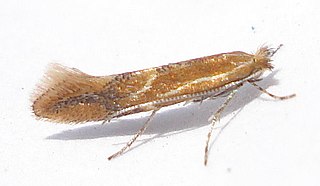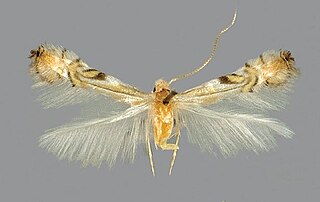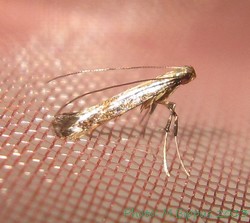
Gracillarioidea is a large superfamily containing four families of insects in the order Lepidoptera. These generally small moths are miners in plant tissue as caterpillars. There are about 113 described genera distributed worldwide, the most commonly encountered of which are leaf miners in the family Gracillariidae.

Gracillariidae is an important family of insects in the order Lepidoptera and the principal family of leaf miners that includes several economic, horticultural or recently invasive pest species such as the horse-chestnut leaf miner, Cameraria ohridella.

Philodoria is a genus of moths in the family Gracillariidae. All species are endemic to Hawaii. It was first described by Lord Walsingham in 1907.

Phyllonorycter is a genus of moths in the family Gracillariidae.

Epicephala is a genus of moths in the family Gracillariidae.

Phyllocnistis is a genus of moths in the family Gracillariidae.
Chrysocercops is a genus of moths in the family Gracillariidae.

Marmara is a genus of moths in the family Gracillariidae.

The European oak leaf-miner or Zeller's midget is a moth of the family Gracillariidae. It is found in Europe south of the line running from Ireland, through Great Britain, Denmark to Ukraine. It is also found in Macaronesia. It is an introduced species in New Zealand and Australia.
Corythoxestis aletreuta is a moth of the family Gracillariidae. It is known from Ethiopia, Nigeria, Rwanda, Tanzania and Uganda.
Aristaea bathracma is a species of moth of the family Gracillariidae. It is known from China, Thailand, Japan (Honshū), the Russian Far East, Mozambique, South Africa, Réunion and Uganda.

Stomphastis thraustica is a moth of the family Gracillariidae. It is known from Democratic Republic of Congo, Congo, Central African Republic, Ghana, Nigeria, Namibia, Zimbabwe, South Africa, Madagascar, Malaysia, Indonesia and India. It was recently also recorded from China.

Phodoryctis caerulea is a moth of the family Gracillariidae. It is known from India, Malaysia (Sabah), Indonesia (Java), Sri Lanka, Fiji, Guam, the Solomon Islands, Japan and Taiwan, as well as Madagascar, Mauritius, Réunion, Uganda and Tanzania.
Conopobathra carbunculata is a moth of the family Gracillariidae. It is known from South Africa, Namibia and Zimbabwe.
Conopobathra gravissima is a moth of the family Gracillariidae. It is known from India, Indonesia (Java), Malaysia (Selangor), the Bismarck Archipelago, Thailand, South Africa, Kenya, Namibia and Zimbabwe.
Caloptilia isotoma is a moth of the family Gracillariidae. It is known from Nigeria, Namibia, Zimbabwe and South Africa.
Caloptilia pentaplaca is a moth of the family Gracillariidae. It is known from Namibia, Nigeria, the Seychelles and South Africa.
Caloptilia prosticta is a moth of the family Gracillariidae. It is known from Madagascar, Nigeria, the Seychelles, South Africa and Sri Lanka.
Caloptilia theivora is a moth of the family Gracillariidae. It is known from Brunei, China, Hong Kong, India, Indonesia (Java), Japan, Korea, Malaysia, Sri Lanka, Taiwan, Thailand and Vietnam.

Gracillariinae are a subfamily of moths which was described by Henry Tibbats Stainton in 1854.








